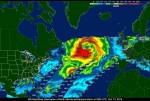
Tuesday, December 20th, 2016
The Chinese seizure of a U.S. underwater drone in waters near The Philippines is raising international concern as well as highlighting the growing strategic and tactical significance of unmanned underwater vehicles (UUVs). According to a statement from Pentagon spokesman Peter Cook, “Using appropriate government-to-government channels, the Department of Defense has called upon China to immediately

Monday, December 19th, 2016
Monitoring drought vital to success of humanitarian relief “Really?” and “Strange, but true” might be popular reactions to the idea that periodic El Niño events in the Pacific Ocean could have a long distance influence on drought conditions in Africa, almost half-a-world away. Unlikely as it may seem, these connections are widely accepted by climate

Tuesday, November 29th, 2016
On Sept. 21, 2014, NASA scientists and engineers launched RapidScat toward the orbiting International Space Station, 250 miles above Earth’s surface, with a few objectives in mind: improve weather forecasting on Earth, provide cross-calibration for all international satellites that monitor ocean winds, and improve estimates of how ocean winds change throughout the day. Following the

Tuesday, October 4th, 2016
Teledyne Optech is pleased to announce it has partnered with The Ocean Cleanup in their Aerial Expedition research mission, where the Optech CZMIL (Coastal Zone Mapping and Imaging Lidar) successfully carried out the first in a series of low-speed, low-altitude survey flights across the Great Pacific Garbage Patch. Every year, about eight million tons of
Wednesday, July 27th, 2016
A team of scientists have used air bubbles in polar ice from pre-industrial times to measure the sensitivity of the Earth’s land biosphere to changes in temperature. The paper published today in Nature Geoscience has verified and quantified the relationship for the first time and shown how it impacts the cycles of carbon between land,
Wednesday, December 23rd, 2015
The Global Ocean Commission welcomed today’s decision by the UN General Assembly to convene in June 2017 the high-level UN Conference on Oceans and Seas, to support the implementation of Sustainable Development Goal 14: Conserve and Sustainably Use the Oceans, Seas and Marine Resources for Sustainable Development. The conference will be held in Fiji from
Wednesday, July 29th, 2015
July 29, 2015 —Thanks to a new system developed by scientists in the UK, taking to the waves for a spot of surfing can benefit research into the health of coastal waters, and could help confirm satellite measurements of sea-surface temperature.
Wednesday, March 26th, 2014
Water from melting glaciers and ice sheets, along with thermal expansion of ocean water due to rising temperatures, are causing global sea-level rise. Scientists are exploiting satellite data to understand better just how much each component contributes to this devastating consequence of climate change.
Friday, March 21st, 2014
Scientists using passive acoustic monitoring to track minke whales in the Northwest Atlantic have found clues in the individual calling behaviors and movements of this species. These findings, recently published online in the journal Behaviour, provide insight into one of the least studied baleen whales.
Friday, February 7th, 2014
Satellite observations of global sea-surface temperature show that a 30-year upward trend has slowed down within the last 15 years. Climate scientists say this is not the end of global warming, but the result of a rearrangement in the energy flow of the climate system and, in particular, how the ocean stores heat.